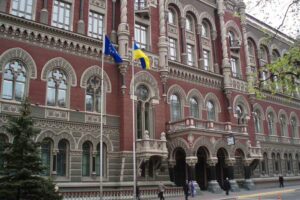
The National Bank of Ukraine (NBU) has approved the Open Banking Concept, which defines the development directions and roadmap for the introduction of API (application programming interface) in Ukraine as a platform for data exchange between payment service providers.
“The introduction of open banking in Ukraine will have a positive impact on the financial services market. In particular, it will contribute to the development of fintech, introduction of innovations in the payment sphere, strengthening competition and, as a result, improving the quality of existing and creating new payment services and products”, – the press service of the regulator reports the words of the deputy head of the NBU Alexey Shaban.
It is pointed out that open banking implies structured and secure data exchange between payment service providers through open APIs.
“We are talking about the development of a new ecosystem based on the application programming interface (API) and designed for the development of payment products and services – more diverse and attractive to customers,” the National Bank notes.
The regulator reminded that according to the law “On payment services” open banking in Ukraine should work in August 2025.
It is specified that open banking provides that banks and other providers of payment services for account maintenance should open their APIs for providers of non-financial payment services with the ability to connect to the interfaces of their services in order to access information on the user’s account and initiate payment transactions.
It is emphasized that in open banking only the user (individual or legal entity) decides who should access his account and a specific amount of information.
The National Bank calls the key advantage of such exchange the opportunity for users of financial services to choose a convenient and modern way of using their accounts, and for businesses to establish mutually beneficial cooperation and get more opportunities to develop their solutions. According to the NBU, with the help of open banking, users will be able to use their account funds more efficiently, using consolidated in one payment application information on the movement of funds and their balance on their accounts opened with different financial institutions.
Unlike traditional banking, open banking relies on the technology network of financial institutions and other non-financial payment service providers to enable them to efficiently share information with the prior consent of the user.
“Thanks to open banking, there will be a transformation of the payment market, stimulating the development of fintechs, new opportunities for the development and scaling of the ecosystem will appear, and the level of competition among payment market participants will increase. At the same time, the regulator will take care of a high level of protection of users’ rights and data security,” the regulator said.
The report notes that the National Bank will determine the basic principles of open banking and directions of its further development in accordance with the urgent needs of the market, as well as will take care of the legal regulation of its work and oversight of compliance of payment service providers with its requirements.
As emphasized in the NBU, technical specifications will be approved by the regulator on the basis of joint developments with market participants.
According to the roadmap for implementation of the concept, in December-February of this year the first version of the technical specifications will be developed by the NBU working groups, also in the fourth quarter of 2023 the first version of the specifications will be agreed by the regulator for testing.
In the first quarter of next year it is planned to form the requirements of stakeholders, in particular, general approaches to the implementation of supervision and protection of users’ rights, IT-security, protection of users’ personal data, as well as to form a list of NAPs (Normative legal acts) and conceptual changes, to determine the legal framework for piloting.
Then, in March-June 2024, the regulator plans to prepare and conduct the first stage of testing of a limited set of APIs and analyze it, identify areas for specification refinement, finalize and develop the second version of technical specifications.
In the second half of 2024, the NBU is going to conduct the second stage of API testing, with a wider set and range of participants, as a result of which the second version of specifications will be prepared. Also, by the end of next year it is planned to approve regulations on authorization, including authorization, finalize the register of payment infrastructure and the procedure of open banking and technical specifications.

The National Bank of Ukraine (NBU) has fined IC Kredo (Zaporizhzhya) 153 thousand UAH for violation of requirements in the sphere of financial monitoring.
As reported on the website of the regulator, the fine was imposed, in particular, for improper fulfillment of obligations to develop and implement internal documents on prevention and counteraction, for failure to provide training activities for agents of the institution (their employees) in order to understand their responsibilities and procedures.
As well as for violations of NBU regulations, in terms of providing the National Bank with information (statistical reporting) on prevention and counteraction with errors, and in terms of improper fulfillment of the obligation to apply a risk-oriented approach in its activities.
Among the violations also named improper fulfillment of the obligation to permanently form and enter in electronic form a list of clients with established by the institution levels of risk of business relations and facts of identification of the client’s belonging to the category of politically exposed persons, family members or persons related to a politically exposed person.
IC Kredo, registered in 2004, specializes on rendering services in the sphere of risk insurance.
According to the data of the company as of the beginning of the current year its shareholders are Steelbrok LLC -41,984%, Scientific and Production Limited Liability Company Neon -14,149%, Victor Krivtsun -12,287% and Vitaliy Chaika -33,835%.

Net sales of dollars by the National Bank of Ukraine (NBU) in the first week of August rose to $458.3m from $349.3m in the last week of July.
According to the NBU on its website, from July 31 to August 4, 2023, its purchase of currency slightly increased from $1.1m to $2.0m, while its sale increased from $350.5m to $460.3m.
At the same time, on the cash market, the dollar, which rose in price by 45 kopecks a week earlier, lost about 20 kopecks this week and at the end of the week was quoted at a rate of about UAH 37.40/$1.
In total, since the beginning of this year, the NBU has purchased $192.4m on the market, while it sold $14bn 741.4m.
As reported, the volume of the National Bank’s interventions in July rose slightly to $1.946 bln from $1.848 bln in June and $1.93 bln in May. However, international financial support amounted to about $4.4 billion last month. As a result, international reserves, which grew by 4.5% in June to a new historic high of $39.00 billion, will exceed this record at the end of July and, according to experts, will reach $41 billion.

The National Bank of Ukraine in its August inflation report worsened its forecast for the country’s 2024 consolidated budget deficit including grants to UAH 1,281 billion, or 16.8% of GDP, down from UAH 811 billion, or 10.5% of GDP, in its April report.
“Deficits are expected to be higher than in the previous forecast, primarily due to the longer duration of security risks, and therefore the need for significant spending on the security and defense sector. Taking this into account, the amount of expected international assistance to finance other expenditures has been increased,” the NBU points out.
In the new report, the forecast of the consolidated budget deficit including grants in 2025 is raised to UAH 883 billion, or 10.0% of GDP, up from UAH 577 billion, or 6.5% of GDP in the April report.
Last year, as the NBU recalled, the deficit of the consolidated budget including grants amounted to UAH 845 billion, or 16.3% of GDP. In the second quarter of this year, it widened to more than UAH 233 billion, and excluding grants in revenue – to UAH 369 billion, or more than 24% of GDP.
“In 2023, the budget deficit excluding grants in revenue is expected to be at the level of the previous year – more than 26.3% of GDP. In the future, due to the increase in revenues, it will narrow to almost 20% of GDP in 2024 and 12% of GDP in 2025 excluding revenue grants,” the National Bank summarized.
It specified that it expects grants to decline from 9.3% of GDP last year to 6.5% of GDP this year, 2.9% of GDP next year and 1.8% of GDP in 2025.
“Given the significant budget deficits for several consecutive years and their financing mainly by debt, as well as the reduction of grant support in the medium term, the debt will approach 100% of GDP,” the National Bank said. It explained that it increased the debt-to-GDP ratio in this forecast compared to the previous one due to the revision of assumptions about the size of deficits upward and grant support downward in 2024-2025.
In particular, the NBU expects government debt to rise from 78.4% of GDP to 84.6% of GDP this year, to 96.6% of GDP next year and to 98.2% of GDP in 2025.
“At the same time, such a high level of debt will have a relatively moderate pressure on the budget in the coming years, primarily due to the receipt of loan funds on preferential terms – at low rates and with a deferred schedule of principal payments,” the NBU believes.

Ukraine’s real gross domestic product (GDP) growth in the second quarter of 2023 compared to the same period last year amounted to 18.3% after a decline of 10.5% in the first quarter, such an updated estimate the National Bank of Ukraine published in an inflation report on its website on Friday night.
According to it, the economic recovery will slow to 4.6% in the third quarter of 2023 and 1.8% in the fourth quarter, with a slight acceleration to 2.6-2.2% in the first and second quarters of next year.
In late April, the National Bank expected GDP growth of 15.9% in the second quarter of this year, and 3.9% and 3.7% in the third and fourth quarters, respectively.
Overall, as reported, the NBU improved its forecast for Ukraine’s economic recovery this year to 2.9% from 2.0% in April (including by improving its estimate of the decline in the first quarter from 13.5% to 10.5%), but worsened it for next year to 3.5% from 4.3%.
“The baseline scenario is based on assumptions about Ukraine’s consistent compliance with the obligations of the Extended Fund Facility Program with the IMF, coherent monetary and fiscal policies, gradual leveling of quasi-fiscal imbalances, particularly in the energy sector. Also, the baseline scenario assumes a tangible reduction of security risks from mid-2024, which will contribute to the full unblocking of seaports, reduction of sovereign risk premium and return of forced migrants to Ukraine”, – the National Bank almost verbatim repeated the paragraph of the previous inflation report, but moved the reduction of security risks from the beginning of 2024 to its middle.
Despite this, the key risk to the forecast is still a longer duration and intensity of the war, which could slow economic recovery and worsen inflation and exchange rate expectations, the National Bank emphasizes.
Among other risks, the regulator named a decrease in the volume or loss of rhythmicity of international aid, the resumption of significant power shortages due to further destruction of energy infrastructure, which will limit economic activity and exports and lead to higher imports and demand for foreign currency.
The NBU also pointed out the risks of export logistics constraints due to large-scale terrorist attacks, the emergence of additional budgetary needs and significant quasi-fiscal deficits, particularly in the energy sector; further complications for agro-products exports.
The National Bank estimates the probability of the risk of prolongation of the war and its escalation, as well as eco-terrorism of the occupants, as well as a quarter earlier, at the level of 25% to 50%.
As for the “grain corridor,” which stopped working in June, although the National Bank estimated this risk at 25-50%, now the regulator gives a 15-25% probability of restoring its work and the same value estimates the new risk of continuing food ban by some European countries, which threatens additional losses of $500 million by the end of this year and a possible reduction in crops.
With a probability of 15-25%, the National Bank also assumes such risks as increased emigration and imbalance of public finances (freezing of tariffs on housing and utility services, reduction of international aid, emission financing of the deficit).
The risk of renewed energy deficit due to damage to infrastructure is on the scale of the National Bank, as in April, at up to 15%.
In this report, as well as in the previous one, there is a mention of such a factor as “Marshall Plan”, which can greatly affect and improve the macro outlook, and its probability the central bank kept at 15-25%.

The Board of the National Bank of Ukraine has decided to resume inspections of banks suspended since March 2020 in connection with COVID-19, and approved the plan of their conduct for the IV quarter of 2023, according to a statement on the NBU website on Thursday evening.
According to it, scheduled inspections of 8 banks will be carried out in the IV quarter of 2023, in particular A-Bank, Bank ¾, TAScombank and MTB Bank.
EPB Bank, Globus Bank, Sky Bank and Family Bank were also included.
“The inspection plan is drawn up with a risk-based approach, taking into account the specificity and complexity of the bank’s operations, the level of risks of its activities and a certain overall assessment of SREP (Supervisory Review and Evaluation Process),” the regulator pointed out.
It recalled that in May it started assessing the stability of banks to determine the real state of the banking sector under wartime conditions.